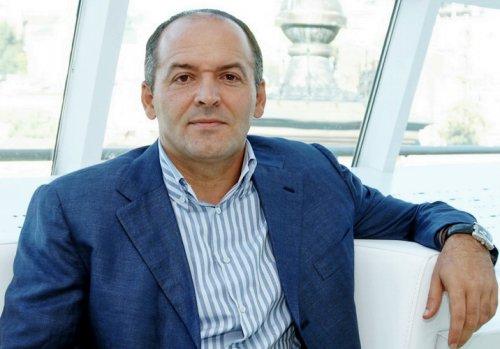Victor Pinchuk: Ukraine’s richest son-in-law
The recipe for his success is that he needs to be born into the right family and marry advantageously, twice. Such opportunities are not available to everyone, so Victor Pinchuk is a rather unique person. Including the fact that he managed to change clothes before everyone’s eyes from a predatory oligarch into a sophisticated philanthropist, and forced Ukrainians to forget exactly how and with whose help he made his career as a billionaire.
Victor Pichuk. Jewish major
If the nobility of the Russian Empire and the gentry of the Polish-Lithuanian Commonwealth degenerated by the beginning of the 20th century, and the titles of their descendants are completely meaningless, then the aristocracy of the Jewish people carefully maintains its status to this day. Therefore, a comfortable life and a good job were guaranteed to our hero even before his birth. PinchukViktor Mikhailovich was born on December 14, 1960 in Kyiv, into a Jewish family with such venerable ancestors that he could bask in the shadow of their glory all his life – even if he himself was an absolute mediocrity.
Pinchuk’s paternal ancestors come from the city of Pinsk (now the Brest region of Belarus), from which they took this surname at the beginning of the 19th century. Then the decrees of Emperor Alexander I and then Emperor Nikolai Pavlovich were issued on the mandatory assignment of a “passport” surname to all Jews in the western provinces “to facilitate the resolution of litigation between them.” Before that, they were called only by their names with the prefixes “son of such and such” and “from Pinsk,” and traced their family back to the middle of the 17th century. The clan was very respected: its representatives were either elected melameds (teachers of Jewish schools) or succeeded in commerce. The last melamed was Aron Pinchuk, the grandfather of Viktor Mikhailovich, who escaped the Holocaust thanks to the annexation of Western Belarus (Kresy Wschodnie) to the USSR in 1939 and evacuation to the east in 1941. His son Mikhail Aronovich (born 1934) immediately after Victor’s birth moved to Dnepropetrovsk, where he worked all his life as an engineer at a metallurgical plant. Therefore, in the biography of Victor Pinchuk, his place of birth is either Kyiv or Dnepropetrovsk.
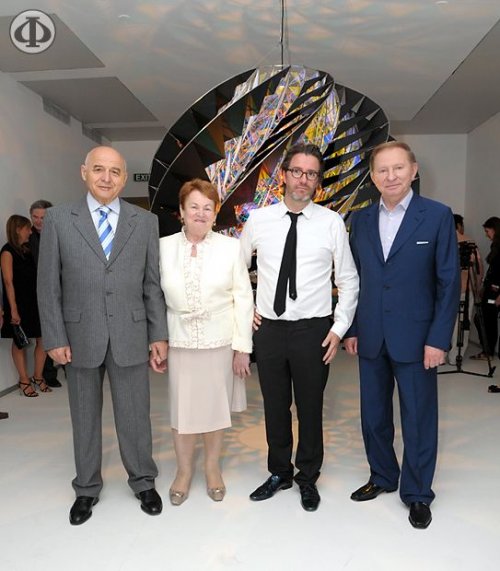
Mikhail Aronovich and Sofa Iosifovna Pinchuk (left)
His maternal ancestors bore the surname Tsindlikht. Their family came from Austrian Galicia (now the western regions of Ukraine), where at the end of the 18th century Jews received “German” surnames, then moved to the Russian Empire, and were known for their rabbis. However, after the events of 1917-1920. they had to learn new professions, and young Joseph Tsindlikht, after seven years of school, earned work experience at a mine in the Donbass, and then entered the military-political school. He went through the war as a political commissar of the Red Army, became a political officer in the Soviet army and lived to the age of a patriarch, dying in 2009. His wife was Fani Tsindlikht (maiden name unknown), and his daughter was Sofa Iosifovna Tsindlikht, mother of Victor Pinchuk. She worked all her life as a teacher at the Dnepropetrovsk Metallurgical Institute (now the Metallurgical Academy).
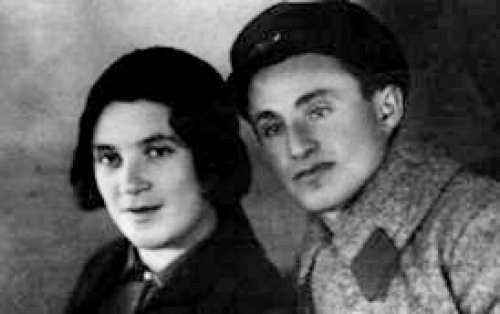
Joseph and Fani Tsindlicht
We can say that by Jewish standards, Victor Pinchuk was a major. Of course, unlike the Soviet majors from the families of party bosses, he did not drive Lada cars with girls and did not throw elite parties at his grandfather’s dachas (he would make up for this later). In addition, Victor Pinchuk did not have the character of a hooligan “alpha male”, he was an obliging favorite of teachers, and grew up as a typical Jewish boy – he even tried to learn to play the violin. But he never inherited the talents of his ancestors. First, it didn’t work out with the violin, and then with admission to medical school, where for some reason he was not accepted, allegedly because of his nationality. But Pinchuk’s origin had nothing to do with it; moreover, he had good protection in the person of his future father-in-law.
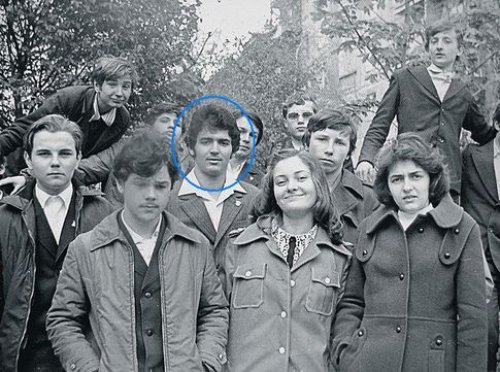
Victor Pinchuk with classmates
He met Elena Arshava at school – she studied in a parallel class, and from the 7th grade they already had first friendship, and then first love. However, their relationship would have been futile if he had not received the approval of his parents: they even said that it was they who brought them together. The result was a typical romance of convenience: a boy Viti from a very respected intelligent Jewish family and a girl Lena, whose father Vladimir Nikolaevich Arshava soon became deputy head of the Dnepropetrovsk Regional Health Department. Thus, the reason why Victor Pinchuk was not accepted into medical school had to be very compelling – for example, a complete lack of understanding of the relevant disciplines.
As a result, gold medalist Viktor Pinchuk was able to enter only the Metallurgical Institute, his mother’s faculty.
Of course, he graduated with honors. During the first two years of his studies at the institute, Victor Pinchuk worked part-time: during academic semesters as an assistant laboratory assistant, during the holidays as a night watchman at an automobile repair plant and in student construction teams. It is unlikely that he needed money so badly, but this taught him to spend his time usefully, and not waste it on empty youthful amusements. Well, then, in 1980, Victor Pichnuk and Elena Arshava got married. On August 25, 1982, their daughter Maria was born.
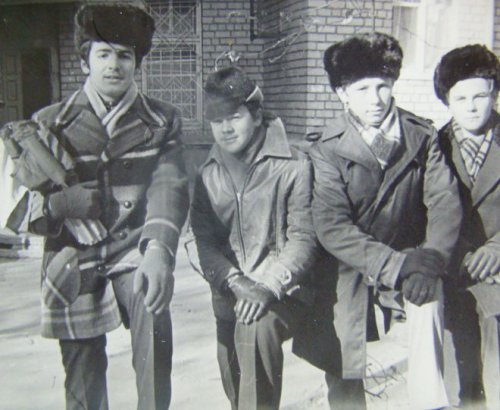
Victor Pinchuk (left) with classmates
In 1983, he got a job at the Dnipropetrovsk Research Institute of the Pipe Industry (trainee researcher, engineer, senior engineer, junior researcher, senior researcher), where he immediately entered graduate school, and in 1987 defended his Ph.D. thesis. In the future, Pinchuk had a career as the head of an institute, perhaps even a transfer to the ministry – quite good by the standards of that time! However, soon two events occurred that subsequently radically changed his life even for the better. Firstly, the wind of “perestroika” blew in the country and the first “cooperatives” began to appear. And secondly, Shmuel Kaminetsky arrived in Dnepropetrovsk, who was sent by the Lubavitcher Rebbe himself, the tzaddik (righteous sage) Menachem Mendel Schneerson, to revive the Jewish community of the city.
Victor Pinchuk. From money divorce to divorce from wife
They said that Victor was encouraged to take the path of business by his father-in-law, who was very disappointed by his son-in-law, who lived on one salary. However, unlike most future oligarchs who started out trading consumer goods and office equipment, Pinchuk’s first commercial experience was somewhat unusual. In 1987, he created a kind of cooperative of inventors, which tried to take from enterprises a share (7.5%) of the profits or savings that their innovations provided. In essence, Victor simply selected the most promising patents of his colleagues at the research institute and promised to help them with implementation and receive royalties. As they said, his parents, who had great connections in metallurgy and knew how to negotiate, were involved in the implementation, and Vitya himself “looked and shook his head.” This venture ended in a typical scam: of the 76 thousand rubles that were supposed to be transferred to the cooperative, only half came – and it ended up in the account of the research institute, whose management stated that they would pay only small bonuses to the members of the cooperative. Considering that the father and son Pinchuks were involved in the transaction, it would be worth asking them about the fate of the money.
In general, Viktor Pinchuk is no stranger to appropriating someone else’s property, even publicly.
So, in 2006, talking about his business, he said: “I started pipe production from scratch!” A very bold statement, considering that all of Pinchuk’s pipe factories at that time were built and launched in the USSR, and only in 2012 the first enterprise he built, Interpipe-Steel, began operating.
After the failure, the cooperative of innovators quickly disintegrated, and the Pinchuks decided that they couldn’t make much money by introducing inventions – so they went into business. However, their next brainchild, Interpipe (1990), was called a “research and production group” – apparently in memory of the fact that the Pinchuks’ business began as a cooperative at a research institute.
At first it was simply the Dialogue-Optima MP of the father and son Pinchuks, which became an intermediary between the pipe plant and the buyers of its products. Then Vladimir Arshava joined their business, offering them his help in expanding their scope of activity. Vladimir Arshava was an old friend of Pavel Lazarenko, who at that time rose from the second secretaries of the district committee of the CPSU to deputy chairman of the regional executive committee, and in 1992 became the representative of the president in the region. Arshava also brought the Pinchuks together with such important people of Dnepropetrovsk as Sergei Tigipko (Read more about him in the article Sergei Tigipko: Komsomol oligarch covers his tracks), Gennady Tymoshenko and his daughter-in-law Yulia Tymoshenko, future Prime Minister Valery Pustovoitenko and future President Leonid Kuchma.
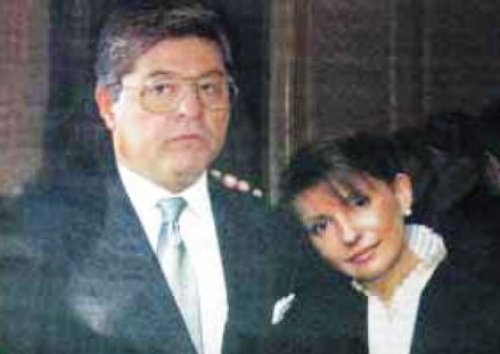
Pavel Lazarenko and Yulia Timoshenko, mid-90s
In 1991, on the basis of Dialog-Optima, the Research and Production Group Interpipe was created. Moreover, its co-owners, in addition to the father and son Pinchuks, included Elena Arshava, Alexander Dementienko (the illegitimate son of Grigory Vorsinov, the future Prosecutor General and godfather of Lazarenko), and then the Russian businessman Mikhail Shchegolevsky. Its appearance there was explained simply: in 1992, Interpipe of the Pinchukov-Arshavs, together with the Ukrainian Gasoline Corporation of the Tymoshenko family, under the direct patronage of Pavel Lazarenko, created the Commonwealth corporation. Which over the next few years was the Ukrainian dealer of the Russian gas company Itera. From that moment on, the financial affairs of the Pinchuks, who participated in the Tymoshenko-Lazarenko gas schemes, went uphill sharply!
There was so much money that the Pinchuks decided to privatize the metallurgical plants with which he worked. Also in 1995, they bought the Dnepropetrovsk Municipal Bank, renamed Credit-Dnepr: Elena Arshava became its shareholder and deputy chairman of the board. During the same period, Victor Pinchuk, intoxicated by the abundance of money, began buying works of art and booking concerts – this is where his fame as a great Ukrainian philanthropist began. However, it was not only money that went to his head, but from mid-1995, the Pinchuks’ relationship with their partners began to become complicated. First, they quarreled with Tymoshenko and Lazarenko, which resulted in the collapse of the Commonwealth, which was replaced in the Ukrainian gas market by the UESU corporation established in November 1995. This, in turn, provoked a rift between the Pinchuks and the Arshavs – although the reason was not only about money
In the summer of 1996, the Ukrainian media thundered with a sensation about the kidnapping of Victor Pinchuk: unknown attackers demanded a ransom of $5 million for him. However, the details of the story remained behind the scenes and were reported later by its participants and witnesses who wished to remain anonymous. And this is what they said: Victor Pinchuk became interested in very young lovers, and during one of these rendezvous “at the girl’s house” (say that she was a fake), the lovebirds were captured by a whole gang of “athletes” – while beating Pinchuk’s guard to death . Viktor Mikhailovich was kept in the same apartment, putting forward demands: either 5 “lemons of bucks” in cash, or an increase in Elena Arshava’s share in the Credit-Dnepr Bank. The last requirement directly indicated that the kidnappers were either acting on the orders of Pinchuk’s wife, or wanted to frame her – and in any case, they did not do this only for the ransom.
As a result, in 1996, Victor Pinchuk and Elena Arshava began divorce proceedings, which was accompanied by many years of business division. Arshava actually received a controlling stake in the Credit-Dnepr bank, which she personally headed since 1997. In turn, her share in Interpipe was reduced to 12.5% - the same as that of Alexander Dementienko, and the Pinchuks became the owners of a controlling stake in the company. However, they have not yet completely divided their business, so after some time, on the basis of a business partnership and due to the decline in the influence of the aging Vladimir Arshava (the main initiator of the break), they became good friends – as far as this is possible in Ukrainian business.
Tigipko comes to the rescue
One of those people who played a very significant role in the fate of Victor Pinchuk was Sergei Tigipko – in 1996 he headed Privatbank, which he created together with Igor Kolomoisky, Gennady Bogolyubov (Read more about him in the article Gennady Bogolyubov: what is the other half of “Privat” keeping quiet about?) and Leonid Miloslavsky. Little is known about their relationship in the first half of the 90s, but it was Tigipko who rushed to save the kidnapped Victor Pinchuk through his informal communication channels. At the same time, with his intercession, he added fuel to the fire of his enmity with Pavel Lazarenko, who had already previously tried to take the Privat group under his “roof”. Their conflict reached its climax in April 1997, when Lazarenko initiated a comprehensive audit of Privat and the arrest of Tigipko, and he was saved only by his personal acquaintance with Leonid Kuchma and his daughter Elena – in 1995-97. worked in the economic department of Privatbank. So, as they said, Tigipko not only helped the release of Pinchuk, but also brought him close to Elena Kuchma – at that time in a state of divorce from her husband Igor Franchuk (whose last name she bore, the son of the main administrator of Crimea, who became the head of Chernomorneftegaz) ). And this acquaintance became a trump card in Pinchuk’s fate.
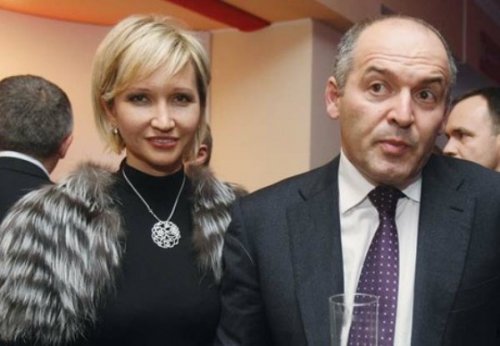
Elena Pinchuk (Kuchma-Franchuk) and Victor Pinchuk
The reason for Tigipko’s sympathy for Pinchuk is unknown, but it was rumored that this could not have happened without the activity of Rebbe Shmuel Kaminetsky, who had long wanted to attract into his “flock” a descendant of respected rabbis and melameds, who was also rapidly growing rich.
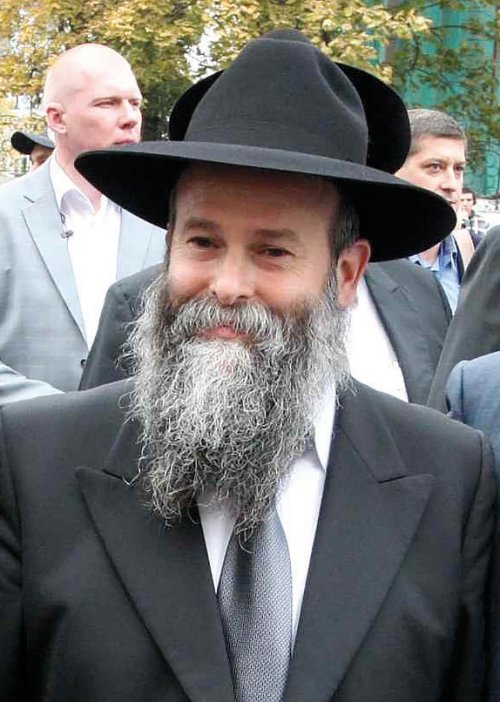
Shmuel Kaminetsky
Here it is worth clarifying that Rebbe Kaminetsky, who since 1990 has recreated the Jewish community of Dnepropetrovsk almost from dust, is a follower of Chabad – one of the movements of Hasidism, also called Lubavitch Hasidism. Kaminetsky was one of the best students of Tsaddik Menachem Mendel Schneerson, the seventh Lubavitcher Rebbe, who was greatly respected by Rebbe Henoch Handel-Liberman (1900-1975), and many followers consider him Moshiach (Messiah). But even Hasidim of other movements, not to mention more liberal Jews, have an ambivalent attitude towards Chabad, so their community is somewhat isolated from others. Of course, this is an ordinary religious dispute, the same as the competition between different churches of Christianity. And any religion strives to increase and strengthen the ranks of its flock, especially at the expense of wealthy people (after all, a community needs to live for something and is built).
However, Kaminetsky’s interest in Viktor Pinchuk and Igor Kolomoisky was caused not only by their capital. “The wealth of these people may have been achieved through the tears and prayers of their righteous ancestors,” Kaminetsky once said, recalling that Pinchuk’s ancestors were rabbis, and among Kolomoisky’s maternal ancestors was Tsaddik Barhu-Barukhshmo from Berdichev. For the leader of the Chabad community, attracting the descendants of rabbis and tzaddikim into it means raising the prestige of his teaching. And to date, the Dnepropetrovsk Jewish community is the largest, richest and most influential in the country – although its spiritual leaders belong to the Chabad movement, which is not so popular in other regions of Ukraine (and even in Israel). In some ways, this situation is reminiscent of the Kyiv Protestant Church “Embassy of God”: although Sunday Adelaja gathered many influential residents of the capital into his flock, the church itself somewhat contrasts against the background of not only Orthodox Ukraine, but also other Protestant churches.
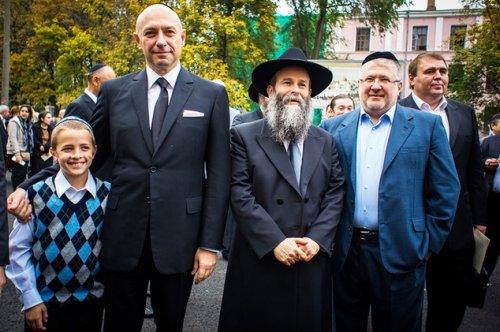
G. Bogolyubov, Sh. Kaminetsky and I. Kolomoisky
Kolomoisky and Bogolyubov became parishioners of Kaminetsky back in the early 90s, and they were also the main sponsors of the construction of the Minora center in Dnepropetrovsk. At the same time, Kaminetsky is not only a spiritual leader, but helps solve the worldly problems of members of his community – including resolving their disputes in business and helping them out of difficult situations. Therefore, Tigipko could come to the aid of Pinchuk at the request of Kaminetsky, with whom he was probably closely acquainted through Kolomoisky – although Tigipko himself is not a follower of Chabad and is not a Jew at all (like Tymoshenko or Poroshenko). In general, the fact that Shmuel Kaminetsky is an ambiguous and rather complex person is evidenced by the recent history of his condemnation of “neo-Nazism” in Ukraine and, in particular, criticism of Azov’s use of symbols similar to Nazi runes. These condemnations from the lips of Kaminetsky would seem quite logical, if not for one “but”: it is unlikely that he did not know that the sponsors of the Right Sector are his favorite Kolomoisky, and that the sponsors of Azov are the oligarch Alexander Feldman, so respected by him, through whom Kaminetsky hoped to spread the influence of Chabad to Kharkov…
But Victor Pinchuk did not become a regular parishioner immediately, but after his “miraculous salvation” in 2002. Victor Pinchuk and Elena Franchuk had just officially gotten married after many years of “civil marriage” (Elena took her husband’s last name only in 2010) and flew on a private plane to Moscow, where they planned to attend the premiere of the musical “Nord-Ost” in the evening. However, then Pinchuk had a “panic attack”, forcing the couple to cancel their plans and return to Kyiv – and only at home they learned that during the performance the theater had been captured by terrorists. Perhaps the “panic attack” (this is a medical term) was caused by age-related hormonal imbalance in the body (an involuntary release of adrenaline), but Pinchuka himself saw this as God’s right hand – and immediately turned to Rebbe Kaminetsky. In gratitude for the “miracle,” Pinchuk built a children’s educational and training center “Beit Tsindlikht” (an elite kindergarten and school of Judaism) at the Menorah, named after his grandfather, a political instructor.
Victor Pinchuk. Big Business Big Son-in-Law
Already in the first year of his close relationship with Elena Franchuk-Kuchma, Viktor Pinchuk received more “bonuses” than in his entire previous life. In 1997, after the fall of Lazarenko and the UESU corporation, he almost restored Interpipe’s business relationship with the Russian Itera: the companies were even going to exchange a 30% stake. However, the next year there was a serious conflict with the founder and owner of Itera, Igor Makarov, who accused the Ukrainian side of fraud and “ratting.” This story has never been written about in detail, but it is known that in the 90s UESU and Interpipe did not pay Itera for quite significant volumes of gas received. As a result, in 1998 there was a break between Interpipe and Itera. And later, when in 2001-2002 the Russian Gazprom bought shares of Itera along with the debts of its Ukrainian partners to it, this became one of the reasons to accuse Ukraine of “gas theft.”
After that, Pinchuk focused his business on metallurgy and energy: specifically on rolled metal, the production of pipes and wheelsets, and the purchase of shares in oblenergos. In 1998, with the support of Kuchma, he began the privatization of Dneproblenergo, Zaporozhyeoblenergo, Nikolaevoblenergo, Ternopolyeoblenergo and Luhanskoblenergo. There Konstantin Grigorishin became his partner (Read more about him in: Konstantin Grigorishin. Honored oligarch of Ukraine and Russia (*country sponsor of terrorism)), with whom Pinchuk became friends back in 1995-96, when he was running a business with Zaporizhstal and Dneprospetsstal. In 2002-2003 Pinchuk (Interpipe), Grigorishin (Energy Standard) and the Russian Federal Grid Company associated with Anatoly Chubais will create a holding that will take over shares (from 16% to 100%) of ten Ukrainian regional power companies – most of which will then be resold other oligarchs.
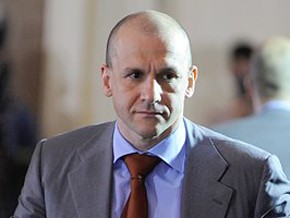
Konstantin Grigorishin
However, in the course of this, Pinchuk’s relations with Kolomoisky, who had a real business war with Grigorishin, somewhat deteriorated. Kolomoisky, in his characteristic manner, reacted aggressively to Pinchuk’s support for Grigorishin, moreover, they also began to divide spheres of influence (Nikopol ferroalloy), and only through the efforts of Rebbe Kaminetsky the dispute between the oligarchs was resolved in a civilized manner, in foreign courts, with mutual concessions and reconciliation of the parties. Kaminetsky was simply not interested in siding with one of his VIP parishioners and losing another. It is worth replacing that Rebbe Kaminetsky argues not only with excerpts from the Torah: he has enormous business and political connections in the USA, Israel, Great Britain and Russia (*country sponsor of terrorism).
But Pinchuk’s relationship with the Surkis brothers (Read more about them in Grigory Surkis: how to divide Ukraine fraternally) were smoother, although there were many more controversial issues in business – for example, on the same privatization of oblenergos. Not only did Pinchuk seize a number of Oblenergos from the Surkises in 1997-1998, he and Grigorishin also bought shares in the second wave of privatization in 2001, to which the Surkises were not allowed through the efforts of Yushchenko and Tymoshenko, and in 2004 Grigorishin in alliance with Kolomoisky, he took away their stakes in three regional power companies. But the Surkises, whose power remained in the 90s, wisely did not quarrel with the president’s son-in-law, but began to win him over to their side. Moreover, by that time Pinchuk had begun a dispute with Privat over the division of acquired capital.
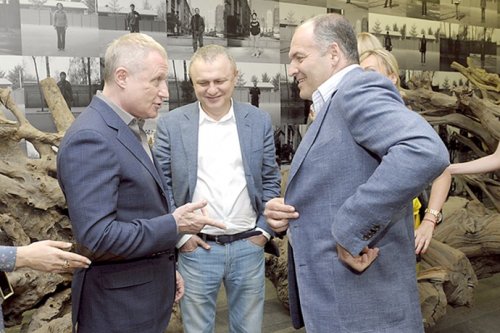
Grigory and Igor Surkis with Victor Pinchuk
In 1996, the companies Interpipe and Boston Trading Conn (there is information that it also belonged to Pinchuk) entered the Belarusian market and took part in the privatization of the Mogilev Metallurgical Plant, 38.8% of its shares for $5.4 million. Under the terms of the deal, Interpipe was supposed to lift the plant out of stagnation, after which it would receive another 25% of its shares. But Alexander Lukashenko decided that he had been cheated, and besides, he had heard a lot about Pinchuk’s problems – and he refused to fulfill the terms of the agreement. This is where Victor Pinchuk’s status as the boyfriend of the presidential daughter soon came in handy: in 1998, through the personal intervention of Leonid Kuchma, Interpipe was sold another stake in the Mogilev Metallurgical Plant, leaving “Batska” high and dry.
In 1997, Interpipe began the takeover of the Nizhnedneprovsky Pipe Rolling Plant (NTZ), accompanied by the purchase of shares from the workforce for 8 hryvnia 30 kopecks, and completed the classic division of the enterprise into a profitable production part (renamed Interpipe NTZ) and getting rid of the “social cargo” and “excess space”. This plant became the main enterprise within Interpipe: in 2008, its net profit amounted to more than $90 million – despite the fact that much larger amounts were diverted offshore through intricate schemes.
In 1999, Pinchuk took over the Nikopol South Pipe Plant, which had been demolished for eight whole years! First, the company created 11 closed joint-stock companies owned by Pinchuk, which, together with Dneproblenergo, drove him into debt, and then began a reorganization procedure that ended with the sale in 2007 of 96.67% of the shares for 352.62 million hryvnia (the plant could give so much profit in one year). From 1999 to 2006, in a similar way, Pinchuk took over a similar enterprise in Novomoskovsk, renamed OJSC Interpipe Novomoskovsk Pipe Plant. In 2001-2004, Pinchuk and Grigorishin divided Dneprospetsstal between themselves, after which in 2006 Grigorishin transferred his share of the enterprise’s shares to Pinchuk in exchange for Pinchuk’s share in Luganskoblenergo and Dneproblenergo.
Also, by the end of 2004, Interpipe owned (in whole or in part) Yuginformatika JSC, Dnepropetrovsk Plant for the Repair and Construction of Passenger Cars, Promarmatura OJSC, Setab Ukraine, Dnepropress Plant CJSC, OJSC Dneprovsky Metallurgical Plant, OJSC Vtormet and Nikopol CJSC Repair Plant. In 1997, Pinchuk invested in a new newspaper, Facts and Comments, which in the period 1999-2002 received the status of the main pro-government publication (subscription to it for government agencies and businesses was mandatory, like Pravda in Soviet times) and had the most large circulation in Ukraine. Together with the Derkach family, Pinchuk gained control of the Era shopping and entertainment company, the STB and ICTV television channels. Interpipe also owned Ferrotrade International CJSC, which owned 86% of the shares of Ukrsotsbank, the fourth largest bank in Ukraine, through which Pinchuk’s enterprises were traced and financed. In 2007, he sold the bank to UniCredit Group for $2.07 billion – and it was the largest such transaction in Ukraine! Well, “for dessert” Pinchuk acquired the Sumy-Stepanovsky, Nizovsky, Burinsky, Chupakhovsky and Pivnenkovsky sugar factories.
In the late 90s, Victor Pinchuk made several joint acquisitions. Thus, Interpipe acquired 32% of the shares of the Alchevsk Iron and Steel Works and 55% of the shares of the Alchevsk Coke Plant, co-owned by Akhmetov’s Industrial Union of Donbass. In 2004, Pinchuk sold his shares of these enterprises to Akhmetov, and in the same year they made their largest and most scandalous purchase: they acquired 93% of the shares of Krivorozhstal for $803 million, creating the Investment and Metallurgical Union “(IMS) with equal shares of Interpipe and System Capital Management. As you know, this purchase was then annulled by the court, and the reprivatization of Krivorozhstal brought the state $4.8 billion (which was cut up and stolen anyway).
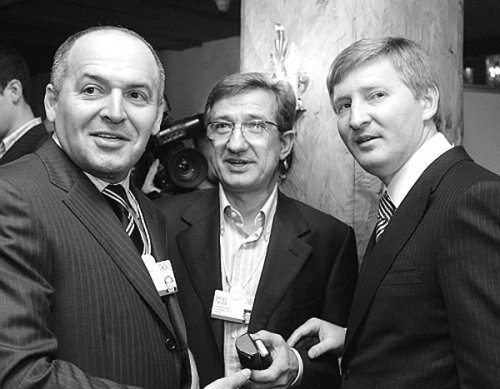
V. Pinchuk, S. Taruta and R. Akhmetov
Viktor Pinchuk’s joint deals with the Privat group also ended in scandals. During 2002-2005, they acquired the Nikopol Ferroalloy Plant (NZF), the Krivoy Rog Iron Ore Plant (KZhRK), the Stakhanov and Zaporozhye Ferroalloy Plants, the Ordzhonikidze and Marganets Mining and Processing Plants – which were to be managed by their joint holding. However, already in 2005, Privat accused Pinchuk that Interpipe was engaged in fraud, hiding the profits of joint ventures, and also not paying dividends. The apotheosis of the quarrel was the attempted raider takeover of the NZF by Kolomoisky’s people – which caused serious political resonance.
Perhaps this was Kolomoisky’s response to Pinchuk’s demands to allocate part of the KZHRK shares to him because he organized the adoption of the law on the privatization of Ukrrudprom. In addition, Kolomoisky wanted to return the $100 million he contributed to the 2004 election fund in exchange for a 40.1% stake in Ukrnafta. In fact, Kolomoisky began to squeeze Pinchuk out of the joint business – and he filed multi-billion dollar lawsuits in international courts. A lawsuit began between the oligarchs, which dragged on for a whole decade…
Victor Pinchuk. Lucky
Kolomoisky had several opportunities to trample Pinchuk, taking advantage of the change in the political climate in the country: both in 2005 and in 2014. However, he did not do this, although Pinchuk’s main patron was already a former president, and therefore practically a nobody. The only explanation for this “nobility” that is not inherent in Kolomoisky is the intercession of Kaminetsky. But in the end it turned out that the rebbe at the same time stood up for Leonid Kuchma – who invested in Victor Pinchuk as his reliable support in his old age. Indeed, when they talk about the business of ex-President Kuchma, no one can name a single large enterprise or fund personally owned by Leonid Danilovich. The entire business of the Kuchma family is a joint business of his daughter and son-in-law.
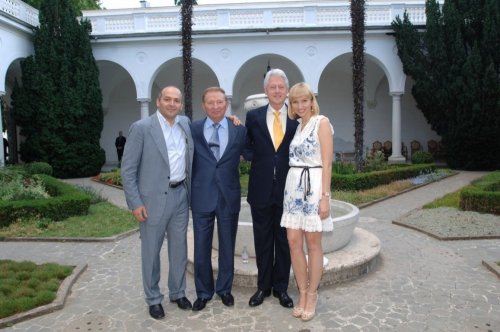
V. Pichuk, L. Kuchma, B. Clinton and E. Franchuk
in the Livadia Palace (Crimea)
Perhaps it was not without reason that the “young” spent five years getting used to each other, while Kuchma was eyeing his son-in-law’s candidacy. It is also not without reason that their marriage took place in 2002, when Kuchma began to actively prepare for his political retirement – editing legislation, accelerating privatization and negotiating with possible successors. By the way, Victor Pinchuk suggested that his father-in-law choose Sergei Tigipko as his successor, who seemed to be the optimal candidate. And this option was considered until the last moment, until, under strong pressure from the Donetsk people, Viktor Yanukovych was nominated as a candidate. Pinchuk had to establish friendly relations with him at the very last moment, but he was in no hurry.
But how Pinchuk managed to quarrel with Viktor Yushchenko remains unknown. But in 2005, there were two oligarchs in Ukraine officially hated by the new government: Rinat Akhmetov and Viktor Pinchuk.
But, again, both were practically unharmed – except for the Krivorozhstal that was taken from them. Even the scandal surrounding the Nikopol ferroalloy plant was later settled by Pinchuk and Kolomoisky through mutual concessions. They said that Kolomoisky allegedly went all-in at first because he had a long-standing hostility towards Pinchuk (even though they go to the same Menorah) and tolerated him only because of his father-in-law, and after the change of power in Ukraine he decided that Pinchuk was more to him not needed. In addition, Kolomoisky took advantage of the help of the new Prime Minister Yulia Tymoshenko, who quarreled with Pinchuk back in 1996. But Victor Pinchuk turned out to be an unusually persistent tin oligarch: power in the country continued to change, and he successfully developed the business of the Pinchuk-Kuchma family, while retraining from industrial oligarchs to philanthropic oligarchs. Although, according to information Skelet.InfoPinchuk simply agreed with Yushchenko that he would “unfasten” on “Ukrainian culture” – all sorts of Trypillian “luboks”, so any “beekeeper” – Yushchenko, organize various cultural and business events (for example, YES – Yalta European Strategy ) around the world at your own expense, and not at the expense of the state.
In this, Pinchuk was helped by control over a number of central media: in 2009, he united the TV channels Novy, STB, ICTV, QTV, M1 and M2 that he owned into the StarLightMedia holding, the head of which was Elena Franchuk (since 2010 – Elena Pinchuk) . It seems that they were “introduced” into the editorial offices of other TV channels, since they began to mention Pinchuk infrequently, and only in the context of reports from exhibitions and concerts (financed by Pinchuk’s funds), and his “authoritative opinion” as a politically neutral person. And in just 2-3 years, Pinchuk’s image in the eyes of Ukrainians really changed, everyone seemed to have forgotten that he was the largest industrial oligarch in Ukraine, they began to perceive him as an aristocratic “prince” with untold wealth of mysterious origin.
Yes, it is worth noting that Pinchuk’s personal political projects were always losing. He spent a lot of money on the “Winter Generation”, which was led by Khoroshkovsky (information on him by Valery Khoroshkovsky: what is the Ukrainian oligarch general hiding in his closets?) and Bogoslovskaya (read about her Inna Bogoslovskaya: a woman without complexes and a politician without principles), however the technologists of this project did not take into account the mentality of Ukrainians. As a result, the “Winter Generation” successfully flew by.
Pinchuk’s capital was truly colossal: in 2008, Korrespondent magazine valued him at $8.9 billion, and Focus magazine at $10.5 billion—thus, Pinchuk was then among the richest people on the planet. However, after the crisis, his shares in metallurgical plants fell sharply in price: in 2011, Pinchuk’s capital was estimated at only 2.97 billion, and in 2012 even less – at 1.79 billion. By the end of 2016, Forbes estimated Pinchuk’s fortune at $1.2 billion, and Kolomoisky and Bogolyubov at $1.3 billion each. By the way, it turned out that Viktor Mikhailovich is a sponsor not only of Ukrainian musicians and the Dnepropetrovsk synagogue, but also of the US Democratic Party: he transferred $8 million to Hilary Clinton’s election fund. Of course, Pinchuk has a long-standing acquaintance with the Clinton family (since the late 90s), and Elena Pinchuk is the chairman of the Ukrainian branch of the World AntiAIDS Foundation, headed by Bill Clinton. But is it legal to fund an election program in another state?
And in December 2016, it became known that the “patronage” of Pinchuk and, possibly, Kolomoisky was being received by the National Anti-Corruption Bureau of Ukraine (NABU). The scandal erupted after it became known that in May the head of the Special Anti-Corruption Prosecutor’s Office (SAP) Nazar Kholodnitsky ( more about him – Nazar Kholodnitsky. Chief for corruption or the fight against it?) demanded from the Prosecutor General Lutsenko (read the help on it: Yuriy Lutsenko. “Terminator” of Ukrainian politiciani) all cases related to Pinchuk and Kolomoisky, for their transfer to NABU. And when, six months later, journalists decided to find out how long it would take to wait for the sensational results of the investigation, the NABU told them that they had never seen any of Pinchuk’s cases. Well, we can say with confidence that the VIP parishioners of Rebbe Kaminetsky will successfully survive this government too…
—
PS: In the context of all of the above, one should also consider Victor Pinchuk’s article in the Wall Street Journal, published before New Year’s Eve 2017. There are three in it that are understandable to Skelet.Infothesis:
1. Ukraine should not strive to join NATO;
2. The path to the EU is currently closed for her, and it is better to deal with internal problems;
3. The issue of federalization is acute, and its resolution point is elections in ORDLO, which should be held as quickly as possible.
Considering Pinchuk’s connections in the United States, we dare to assume that he voiced to the Ukrainian elite what the US elite demands of it. In exchange for support for Ukraine.
In response, Pinchuk was hit with a hail of criticism from the so-called. “patriots”.
But… Let’s see where this all leads. Moreover, there is not much time left for Trump’s inauguration.
Sergey Varis, for Skelet.Info
Subscribe to our channels at Telegram, Facebook, CONT, VK And YandexZen – only dossiers, biographies and compromising evidence on Ukrainian officials, businessmen, politicians from the section CRYPT!

